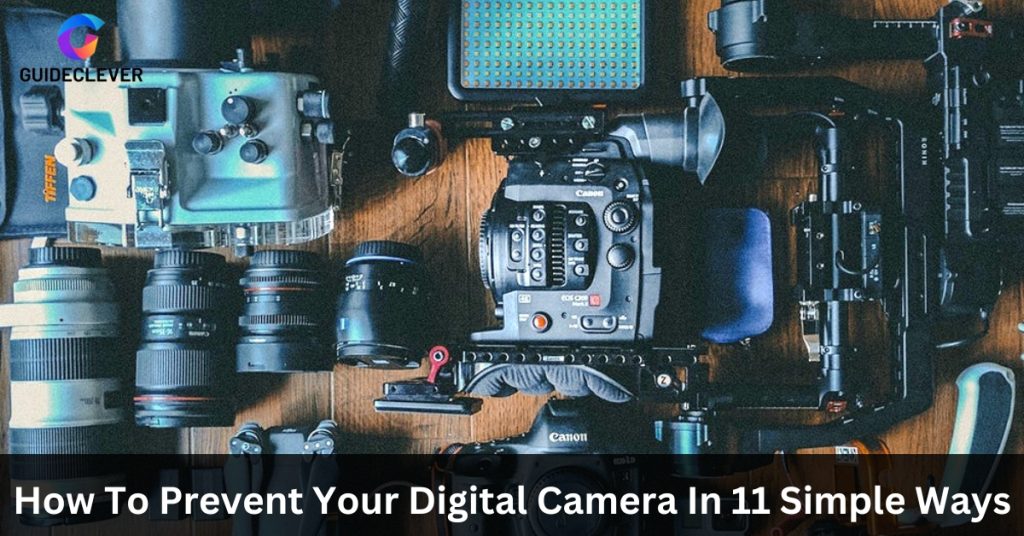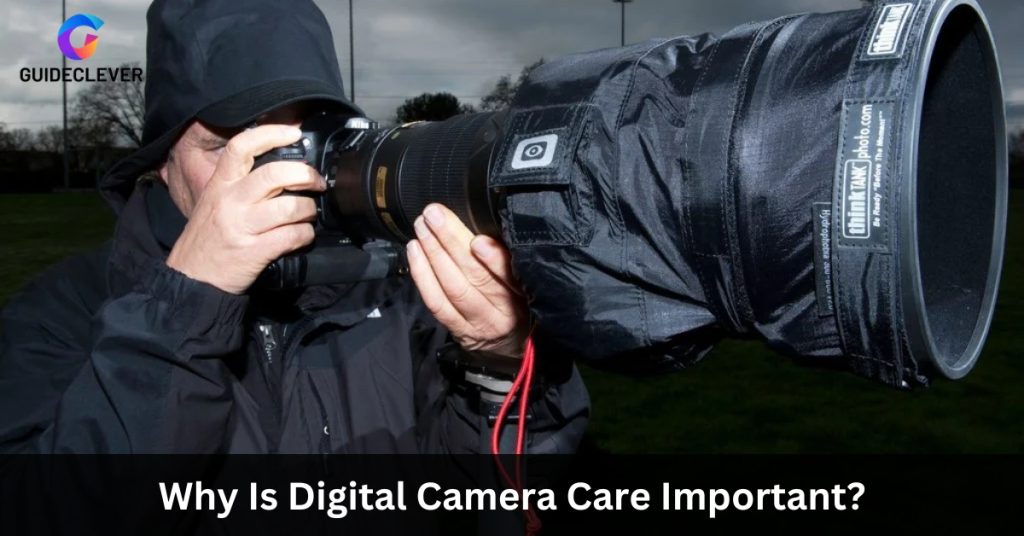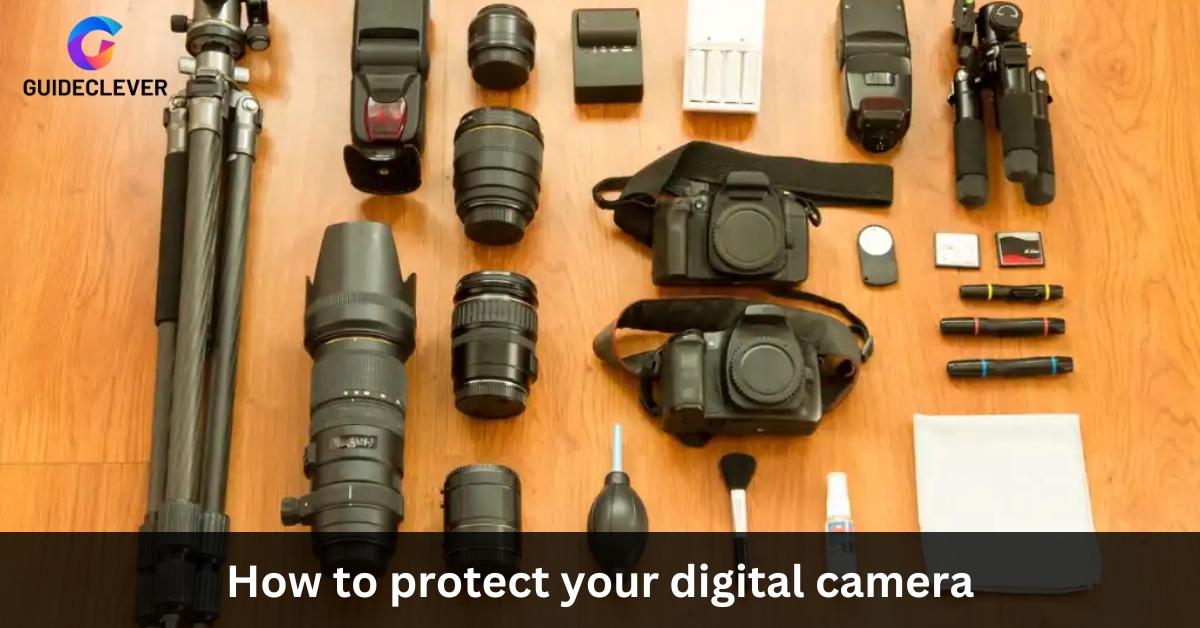How to protect your digital camera is essential for maintaining the quality of your photographs. As well as its accessories also prevent costly repairs. Always store your camera in a cool, away from moisture and in a dry atmosphere.
You should also avoid exposing it to dust or dirt. Clean any lenses with a soft cloth known not to leave streaks. Plus, don’t forget to update the firmware regularly.
Additionally, replace worn or damaged cords immediately. Every photographer needs to take tips and advice on protecting their digital camera!
Practicing these simple steps in this blog post will ensure your camera stays safe and secure. And in optimal condition, you can continue capturing amazing photos for years!
Now we will try to detail how to protect your digital camera in 11 simple ways. Then it is not too late to find out what is in this post!
Contents
- 1 How To Prevent Your Digital Camera In 11 Simple Ways
- 1.1 #1. Use A Protective Case Or Bag.
- 1.2 #2. Keep Your Camera Clean.
- 1.3 #3. Store Your Camera.
- 1.4 #4. Back up Your Photos.
- 1.5 #5. Use A Uv Filter
- 1.6 #7. Use Camera Rain Cover
- 1.7 #8. Use A Screen Protector
- 1.8 #9. Take Spare Batteries
- 1.9 #10. Protect Your Camera From Condensation
- 1.10 #11. Proper Use of Camera Strap
- 2 Why Is Digital Camera Care Important?
- 3 Faqs:
- 4 Final Thoughts | How To Protect Your Digital Camera
How To Prevent Your Digital Camera In 11 Simple Ways

#1. Use A Protective Case Or Bag.
When it comes to protecting your digital camera, there are a variety of camera bags or cases to choose from. You can easily choose them. For example:
- You are a stylish shoulder bag.
- Strap a large backpack-style bag.
Also, with these, you can opt for a small case or even an all-in-one waterproof casing. Depending on the type of camera you have, there should be one available that meets your needs.
#2. Keep Your Camera Clean.
Keeping your camera clean and dust-free is important for maintaining image quality. As dirt and dust build up, internal components can suffer irreparable damage. This can lead to costly repairs or cause your photos to have poor quality.
This happens because dirt and dust interfere with the light from the lenses. Ensure to clean your camera with a soft, lint-free cloth or brush. This removes any dirt or dust particles that have accumulated.
#3. Store Your Camera.
When you are not using your digital camera, storing it in a cool, dry place is important. Avoid storing your camera in humid or damp environments, especially if you shoot in inclement weather. Store your camera away from direct sunlight and other heat sources.
Also, check the battery levels before storing your camera away and remove any memory cards or lenses you may be using with your camera.
#4. Back up Your Photos.
Backing up your photos is a must if you want to keep them safe and secure. A computer or external hard drive is a great way to create a local backup of your photos. These cloud storage services provide off-site protection in case of natural disasters.
When backing up photos from your digital camera, transfer them to a computer. As well as it does external drives in their original file format. This will ensure your images remain high quality & maintain the best possible resolution.
#5. Use A Uv Filter
A UV filter is a small piece of safety glass attaches directly to the front of your camera lens. It works by blocking harmful ultraviolet (UV) rays, which can damage photos and digital cameras if not properly filtered. Additionally, the filter lessens glare and reflections. This is very beneficial when you’re shooting outdoors.
#6. Be Mindful Of Weather Conditions
When shooting outdoors, it’s critical to be knowledgeable about the weather. High humidity and extreme temperatures can cause condensation on your camera’s lenses or sensors. This can result in blurry photos or permanent damage. Additionally, strong winds and rain make your camera more vulnerable to water damage.
So to avoid any potential problems, check the local weather forecast before heading out with your camera. Also, take proper precautions. If the conditions are too extreme, you may have to consider postponing your shoot until later.
#7. Use Camera Rain Cover
If you plan on shooting in inclement weather, a camera rain cover is an essential accessory. This is particularly useful because it’s crucial to be informed of the weather conditions. And also help to protect the internal components from dust or dirt particles in the air.
They typically slip over your camera body with one sleeve for each lens and are available in various sizes to fit most digital cameras. Make sure to opt for a waterproof and breathable cover so your camera stays dry while you shoot.
#8. Use A Screen Protector
It is a thin sheet of protective material placed over your digital camera’s LCD screen. This helps prevent scratches, smudges, and other damage from happening to the screen, affecting how easily you view your images. It may also affect being able to navigate through the settings.
The benefits of using a screen protector also extend to the exterior of your camera. By keeping the LCD screen safe, you can assist in reducing the quantity of dust and dirt. This accumulates on the exterior of your digital camera over time.
Using a screen protector is inexpensive to keep your digital camera in tip-top shape. They are easy to install and can buy for a fraction of the cost of replacing the LCD screen if it is damaged.
#9. Take Spare Batteries
When shooting photos with any digital camera, it is important to have spare batteries on. This will help ensure that you are always prepared should the battery in your camera die. Remember to check the voltage of your spare batteries before you go out and ensure they charge up before you leave.
Also, to spare batteries, it is also a good idea to bring a power bank or portable charger with you. This will add an additional layer of defense for you. It will also guarantee that you will never run out of power. Even when shooting for extended periods.
#10. Protect Your Camera From Condensation
When transitioning from cold to hot temperatures, your camera is at risk of condensation. Allow your digital camera to adjust to the new environment to prevent any damage. In some cases, it happens for a few hours before use. Additionally, if you plan to shoot in extreme weather conditions, consider bringing a drying agent. Such as:
- Silica gel packets or
- A desiccant box
This helps regulate the humidity in the camera environment.
#11. Proper Use of Camera Strap
A camera strap is one of the most important accessories for any digital camera user. It not only helps to keep your camera safe and secure, but it also makes it easier to carry around and use. To properly use a camera strap, attach it securely around the neck or wrist before shooting.
Additionally, avoid pairing it with any clothing or accessories. Because this can cause the camera to catch or get stuck. And always remember to remove the strap before removing your camera from the bag or case.
These simple preventative steps will help keep your digital camera in top condition and ensure you get the most out of it every time you use it.
Why Is Digital Camera Care Important?

Protecting your digital camera is important to preserving its longevity and performance. Not only will proper care help to ensure that your camera stays in top condition for longer. But it can also help protect you from any unnecessary repair costs down the line. By taking a few simple steps to protect your digital camera now, you can avoid costly repairs or replacements in the future. So take the time to follow these tips, and your digital camera will be ready for any adventure!
Faqs:
How Can You Protect Your Camera From Damage?
You may take certain precautions to guard against damage to your digital camera. These include:
- Investing in a good quality camera bag.
- Using a screen protector.
- Carrying spare batteries.
- Protecting your camera from condensation.
- And properly using your camera strap.
How To Protect The Camera From Rain Diy?
If you plan on shooting in the rain, you can take a few DIY measures to protect your digital camera. Start by covering the camera with a waterproof bag or case. This will assist in protecting the camera from moisture or rain and keeping it dry. You can also invest in a rain shield to cover the lens and keep any water droplets from getting on it.
Now we end the post with some last words about how to protect your digital camera.
Final Thoughts | How To Protect Your Digital Camera
Protecting your digital camera is key to preserving its functionality. Additionally, ensure to maximize your use of it at all times. You can safeguard it by taking a few easy actions. Such as investing in a good quality camera bag, using a screen protector, and carrying extra batteries. Also, protect your camera from condensation. And using your camera strap can help ensure your digital camera stays in top condition for years. So take the time to follow these tips, and your digital camera will be ready for any adventure!
Suppose you have any more questions about how to protect your digital camera. Please do not hesitate to get in touch with us! We’re here to help.
Happy shooting!


